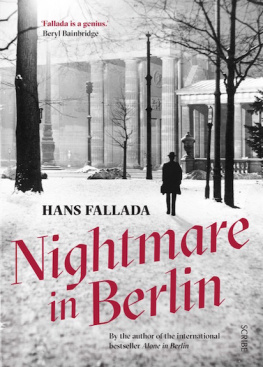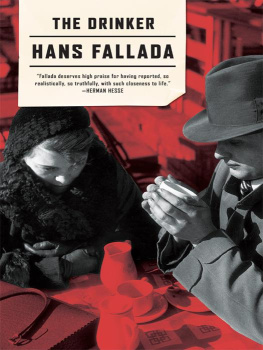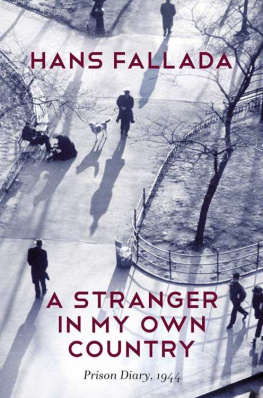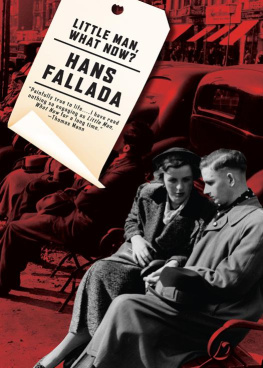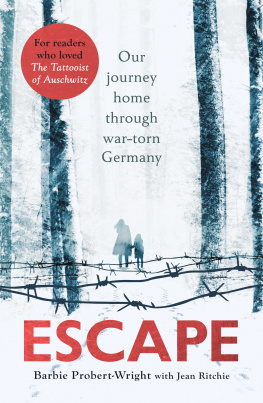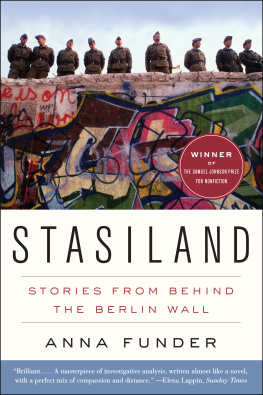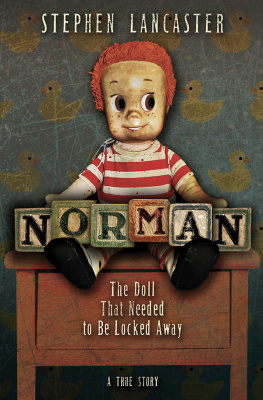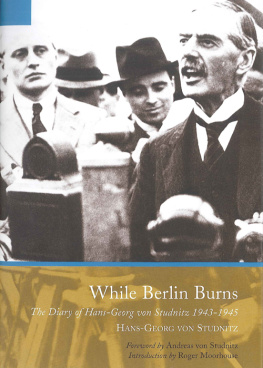NIGHTMARE IN BERLIN
Hans Fallada was the pen name of German author Rudolf Ditzen, whose books were international bestsellers on a par with those of his countrymen Thomas Mann and Hermann Hesse. He opted to stay in Germany when the Nazis came to power, and eventually had a nervous breakdown when he was under pressure to write anti-Semitic books. Immediately after the war he wrote Nightmare in Berlin , which preceded his last novel, Alone in Berlin .
Dr Allan Blunden is a British translator who specialises in German literature. He is best known for his translation of Erhard Epplers The Return of the State? which won a Schlegel-Tieck Prize. He has also translated biographies of Heidegger and Stefan Zweig, and the prison diary of Hans Fallada.

Scribe Publications
1820 Edward St, Brunswick, Victoria 3056, Australia
2 John Street, London, WC1N 2ES, United Kingdom
First published in English by Scribe 2016
First published as Der Alpdruck by Aufbau in 1947
Copyright Aufbau Verlag GmbH & Co. KG, Berlin 1947 and 2014
Translation Allan Blunden 2016
All rights reserved. Without limiting the rights under copyright reserved above, no part of this publication may be reproduced, stored in or introduced into a retrieval system, or transmitted, in any form or by any means (electronic, mechanical, photocopying, recording or otherwise) without the prior written permission of the publishers of this book.
The moral rights of the author and translator have been protected.
9781925321197 (Australian paperback)
9781925228380 (UK hardback)
9781925307382 (e-book)
CiP records for this title are available from the British Library and the National Library of Australia
scribepublications.com.au
scribepublications.co.uk
CONTENTS
PART ONE:
PART TWO:
GERMAN PUBLISHERS FOREWORD TO THIS EDITION
Hans Falladas penultimate work, Der Alpdruck [ Nightmare in Berlin ], appeared under the Aufbau imprint in the autumn of 1947, but the German publishers warm commendation and sustained international lobbying elicited only a handful of foreign-language editions in French, Norwegian, Italian, and Serbo-Croat despite the countless translations that had been brought out earlier by Falladas various foreign publishers. Contemporary publishing houses reacted to this novel in much the same way as Britains Putnam had to Jeder stirbt fr sich allein [ Alone in Berlin ]: it was felt to be a weaker product from a once successful writer, the author of Little Man What Now? and other global bestsellers, whose demise was widely mourned, as he might well have produced further masterpieces had he been granted a longer span of life.
In the case of Alone in Berlin , posterity has already come to a very different conclusion. Sixty years on, this last work, which initially met with a rather muted response, has become what is probably his biggest international success, which has moreover significantly altered the perception of Fallada and, to some extent, of Germany itself. So the question is whether the same can be claimed for Nightmare in Berlin , the book that Fallada was working on in the immediate aftermath of the collapse of Nazi Germany, from February to August 1946 (for some of that time as a patient in various sanatoriums and hospitals), and which by his own account he needed to get out of the way first before he could tackle the subject matter of his next book. He had already started to study the Gestapo files from which he drew the material for Alone in Berlin , but it was only after writing Nightmare in Berlin that he was able to turn these shocking and extraordinary documents into another novel.
But why, after the sensational late success of Alone in Berlin , in which Hans Fallada, through the story of the seemingly futile resistance of ordinary people, paints an unsparing picture of the moral ambivalence of an entire society, would one want to re-issue a book (or indeed read a book) which, in the words of reviewers at the time of its first publication, is a kind of thinly disguised autobiography which it is difficult to read with any great pleasure ( Schwbisches Tagblatt ), and which was seen as a confession of his own human weakness and a picture of life in Germany in the wake of its downfall ( Leipziger Zeitung ), and as an account that is perhaps not yet sufficiently distanced from the horrendous events of Hitlers war ( Freie Presse )?
Well, Cossee for one, the distinguished Dutch publisher of Falladas works, did not even ask itself this question prior to the recent publication of Der Alpdruck in a Dutch translation, along with the other important late works with which the book belongs by virtue of its subject matter and genesis: In meinem fremden Land (Gefngnistagebuch 1944) [published in English as A Stranger in My Own Country: the 1944 prison diary ], Der Trinker [ The Drinker ], and Jeder stirbt fr sich allein [ Alone in Berlin ]. Cossees initiative is to be applauded: for with the directness of its observations from a long-suppressed phase of German history that time between the end of the evil old order and the gradual emergence of a new one, when life was on hold, abandoned by the past and still in search of a future this book fills a gap that far more comprehensive and ambitious works such as Kasimir Edschmids Das gute Recht (published in 1946) had not been able to fill. This is true of provincial life (Mecklenburg, in this case), which was more or less marginalised anyway in the literary treatment of these times; but more especially is it true of Berlin, the setting for the last months of Falladas life: the city punished for its historic guilt, where the local population and the author were both fighting for their survival lost and adrift to begin with, but then increasingly with a single-minded determination born of necessity.
More especially, this child of his times, this writer caught up in a private battle for survival, for a firm stance, for a clear perspective on his own guilt, achieved something unique, which has perhaps been best summed up by his obituarist Johannes R. Becher (who appears in this book in the guise of Dolls advocate and champion, Granzow): The contradiction that he embodied was not just private and personal. He embodied and represented, in his mental and spiritual crises, a general German condition. Nowhere in Falladas work is this more true than it is here, in Nightmare in Berlin .
When the protagonist, the writer Dr. Doll easily recognisable as a figure based on Falladas own experience tells us that he is filled with a feeling of utterly helpless shame, the malady of the age, a mixture of bottomless despair and apathy, this private mentality shared by Hans Fallada represents that of German society at large, which found itself in a state of crisis. It is hard to imagine a more striking or immediate insight into the psyche, the dawning realisation of a German living in those times who had not been a supporter of the Nazis, but who had also not done anything to oppose them, who had come to an accommodation of sorts with them, than the following scene. Doll thinks he can welcome the occupying Russian troops joyfully as long-awaited liberators, only to be confronted with a different reality: He was a German, and so belonged to the most hated and despised nation on earth. [] Doll suddenly realised that he would probably not live long enough to see the day when the German name would be washed clean in the eyes of the world, and that perhaps his own children and grandchildren would still be bearing the burden of their fathers guilt.
Tragic episodes like the story of the chemist and his family who had survived all kinds of horrors, but now tried to take their own lives because they were afraid of the Russians, alternate with more mundane observations, such as the fact that nobody who had not seen Berlin for a while could find their way around any more, since all the familiar landmarks had disappeared under a uniform landscape of rubble. Fallada directs a pitiless gaze at the all-encompassing misery around him, which was also his own: But what Doll had not foreseen was a new loss of self-esteem. [] They would be left naked and empty, and in letting go of the lies that had been drip-fed to them all their lives as the most profound truth and wisdom, they would be stripped of their inner resources of love and hate, memory, self-esteem, and dignity. He paints a frank picture of Doll and Almas drug addiction, clearly drawing on his own experiences in a series of touching, sometimes pathetic, and at other times supremely comic descriptions, as when Doll and Alma, cunning and brazen by turns, are forever angling for fresh supplies of their little remedies from hospital doctors or GPs (and here Gottfried Benn puts in a guest appearance as Pernies, the doctor with the papery skin).
Next page
